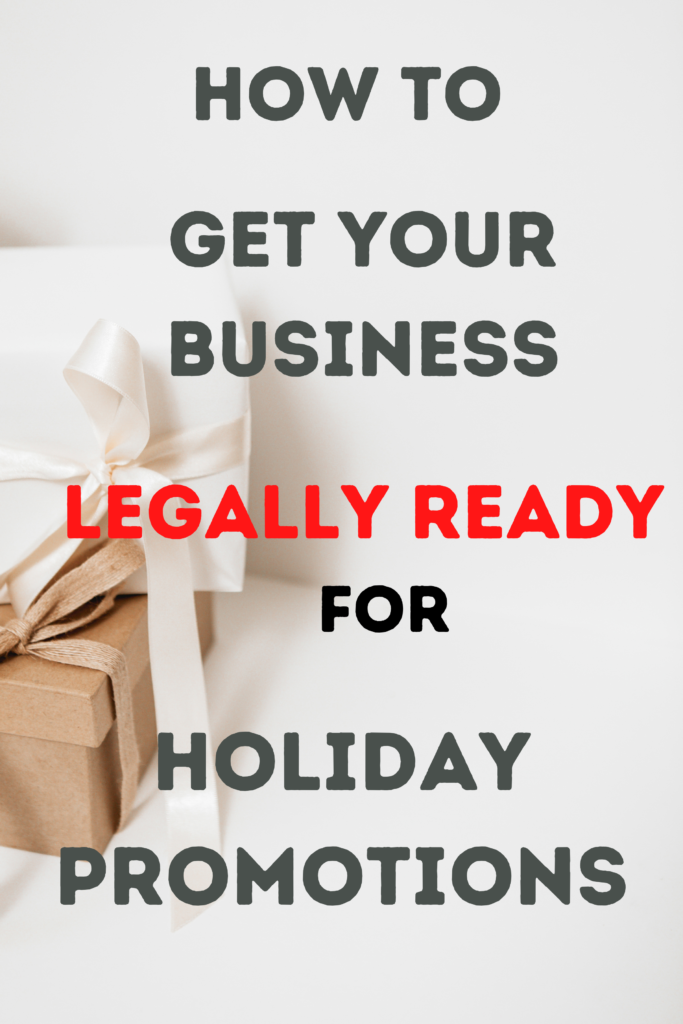A holiday promotion can be one of the wisest ways for you to boost your business revenue. According to eMarketer, holiday e-commerce sales will rise 11.3% this year to approach $207 billion. If you are unaware of what a “holiday promotion” is and how you can legally ace it, this article is for you! A holiday promotion is a marketing technique where business owners lower their prices, give freebies, or offer discounts in order to boost their sales. Whether online or physical, every business tries its best to think of a perfect campaign to make its holiday promotions stand out. This not only increases sales, but also attracts new and returning customers to make a purchase.
Why should I sell during the holidays?
Sales are one of the reasons why we have holiday promotions. During the holiday season, the intent of the buyers to purchase is high. You’re more motivated to market your products as there’s a big possibility that your products will be seen by your customers. But you might say, there are lots of days or dates to do a promotion. Why should I do it during the holiday season? Well, that’s exactly the reason why. It’s the holiday period and running a promotion will create a sense of urgency that can push the customers to buy. Holidays are seasons full of positivity and people are looking for ways to make their loved ones happy. You can capitalize off of your customer’s emotions during this time to increase your sales.
4 Common Holiday Promotions
Since marketers and businesses discovered the beauty of holiday promotions, campaigns have become really common that they even became a part of consumers’ tradition worldwide. Here are the most common holiday promotions that a lot of businesses choose to participate in:
Black Friday
Who doesn’t know about “Black Friday”? It is a common holiday promotion that businesses run as it is the time people are rushing and willing to buy something. It refers to the day after the U.S thanksgiving, and this year, it falls on the 26th of November. This day consists of great shopping deals and heavy discounts that attract tons of customers.
Small Business Saturday
After Black Friday, Small Business Saturday was created in order to support small businesses. Since the idea is positive in nature, many customers are attracted to make purchases to support their local community.
It falls between November 24 and November 30 as it is always the last Saturday of November.
Cyber Monday
Where there is a Black Friday deal, there’s usually a Cyber Monday deal that follows. Cyber Monday is on the first Monday after the Thanksgiving holiday in the United States. It features online businesses that have created deals similar to ones on Black Friday and last for 24 hours. It is by far the biggest online shopping day of the year and has massive promotion opportunities for online businesses.
Free Shipping Day
Who doesn’t love free shipping? Everyone, right? (I mean I stalk the internet before purchasing to make sure there are no discount coupons or free shipping deals) Well, that’s the reason why Free Shipping Day was created. Free Shipping Day falls during mid-December and this year, free shipping day will fall on Tuesday, December 14. And as it sounds, it’s a time where businesses, both large and small, offer free shipping to their customers.

How To Get Your Business Legally Ready For A Holiday Promotion?
Running a holiday promotion is not always easy. It’s essential to prepare early so that your promotion runs smoothly. And speaking of the things that you must consider, you must focus on this one thing that a lot of businesses are not paying attention to—the legal aspects! But don’t worry! I am here to tell you what you need to run your holiday promotion and get sales legally. Here are 5 steps that you need to consider:
1. Have A Holiday Promotion Refund Policy
This means that you must have your refund policy in place and it must be well-defined. Yes, returns are definitely normal and the costs can be overwhelming to your business. But having no refund policies can cost you money AND tarnish your company’s reputation.
Why Are Refund Policies Important?
If you think that customers don’t care about refund policies, you are WRONG. According to V2 Data, more than 60% of consumers review a return policy before making a purchase.
The easier, the better.
Additionally, UPS has labeled January 2, the second and largest spike in returns during the holidays as “National Returns Day”.
Consumers do not trust retailers or sellers that don’t have a refund and return policy. Additionally, if your return and refund policy isn’t flexible, that’s a deterrent to buyers.
However, refund policies shouldn’t just be for the customer’s welfare. You have to ensure that your business will benefit from the policy too. When you have a great return policy, Invesp indicates that 92% of shoppers say they will buy again if the returns process was easy.
This is a win-win situation, because repeat customers (and potential referrals) are the ultimate goal.
Remember that if you make the return and refund process easy, your customers are more likely to make a purchase without fear of consequences, and remember you as a trustworthy business.
How to Write a Top Notch Refund Policy
As mentioned earlier, customers are interested in your refund process. The question becomes “How can I write a good refund policy?”. Here’s what you’ll want to include:
- A time frame in your refund policy
- The acceptable condition of the product when returned
- Clear language
- How they’ll receive their refund (credit to the store or the original payment method)
2. Have A Chargeback System In Place During a Holiday Promotion
Aside from a great refund policy, having a chargeback system saves you from holiday promotion stress. If you aren’t familiar with chargebacks, it’s a way to protect consumers by requesting a charge from a merchant to be reversed. Although helpful to consumers, you have to be careful with chargebacks as they can be malicious or mistakes, which make the merchant subject to penalties.
Why Do You Need A Chargeback System For Your Holiday Sales?
As mentioned, chargebacks subject you to penalties when a certain threshold is exceeded. To prevent this headache-causing scenario, a chargeback system is a must. Normally chargebacks go through the following steps:
Phase 1 – Submission: This is the time where a consumer goes to their bank to file a complaint.
Phase 2 – Vetting: During this time, the issuing bank will check if the consumer’s complaint is valid. If there’s validity to the complaint, the bank will initiate the chargeback process. The issuing bank determines whether or not there is validity to the consumer complaint and the first step would be notifying the merchant’s bank.
Phase 3 – Investigation: This is the time that the merchant bank will notify the retailer after they received the questions in the purchase. What the bank usually does in this phase is to make sure that there is transactional evidence for the complaint.
Phase 4 – Decision: When the bank is done investigating and when they have justified the complaint, they will notify the business and the business will handle the amount of the claim plus the chargeback fees that may vary by bank. Usually, it ranges from $50 to $75. However, if the retailer provides evidence that the transaction is valid, no chargeback will be issued. To prevent chargebacks:
- Have a refund policy in place
- Save all communications with purchasers
- Save contracts, invoices, delivery confirmations, photos (if they’ve shown it on social media)
- Verify logins and downloads for digital products
- Verify addresses and security code of credit card
- The checkbox at checkout saying they agree to terms and conditions
3. Enforce Your Intellectual Property (IP)
Another legal tip for your holiday promotion is to enforce your intellectual property. Whether you are a startup or a well-established company, protecting your intellectual property is key. What is Intellectual Property(IP)? For businesses, intellectual property consists of trademarks, copyrights, patents, trade secrets, etc. Your IP differentiates your business from others.
Your IP must be enforced as your organization can suffer if it’s been used without permission. That’s why you need to monitor your confidential information, trademarks, and content, during the holidays.
These types of intellectual property are especially at risk of being infringed upon by others who want to use your goodwill and brand equity to take away sales from you during the holidays.

4. Comply With FTC Advertising Rules
Advertising is the backbone of a campaign’s success. It leads to a wide reach and an increase in your brand’s awareness. These days advertising is common in all giant platforms like Facebook, YouTube, Tiktok, Twitter, Pinterest, and more.
But advertising requires legal compliance from the Federal Trade Commission rules.
What Are FTC Advertising Rules?
The FTC aims to protect consumers from fraud, deception and unfair business practices. It also enforces federal antitrust laws that prohibit business practices that lead to higher prices, less innovation and even fewer choices.
Why Complying With FTC Advertising Rules Is A Must On A Holiday Promotion
In order to maintain a good reputation with your existing and incoming customers, you’ll want to prevent your business from falling into misleading marketing practices. Customer trust is essential, yet hard to achieve, especially in the online business world. That’s you need to provide customers with a clear and full statement of fees, what they are receiving, recurring charges, subscription renewals and most importantly, you must ensure that advertised prices do not hide the total cost of your goods or services. Additionally, any disclaimers need to be clear and conspicuous.
5. Comply With The Payment Gateways During A Holiday Promotion
If you are an online merchant, a payment gateway is your lifeline. When your secure payment page receives any card details, the payment gateway is the first to receive that information.
It will connect to the issuing bank to check and authenticate the payment details, ensuring your business’s protection from fraud.
After the bank checks all the information, the payments will be accepted or declined by the gateway based on the bank’s decision.
Why Is It Important To Comply With Payment Gateways?
Furthermore, during the holiday season, online transaction numbers increase, putting your business at risk to black hat hackers. It is best to comply with payment gateways as they offer cost-effective solutions for eCommerce businesses’ payment systems.
And you don’t want any interruptions during the busy season on how customers can pay you.
Each payment gateway is different when it comes to the security, convenience, and flexibility that your company needs to support selling online. What works best for your business depends on your customers and your platform.

+ show Comments
- Hide Comments
add a comment